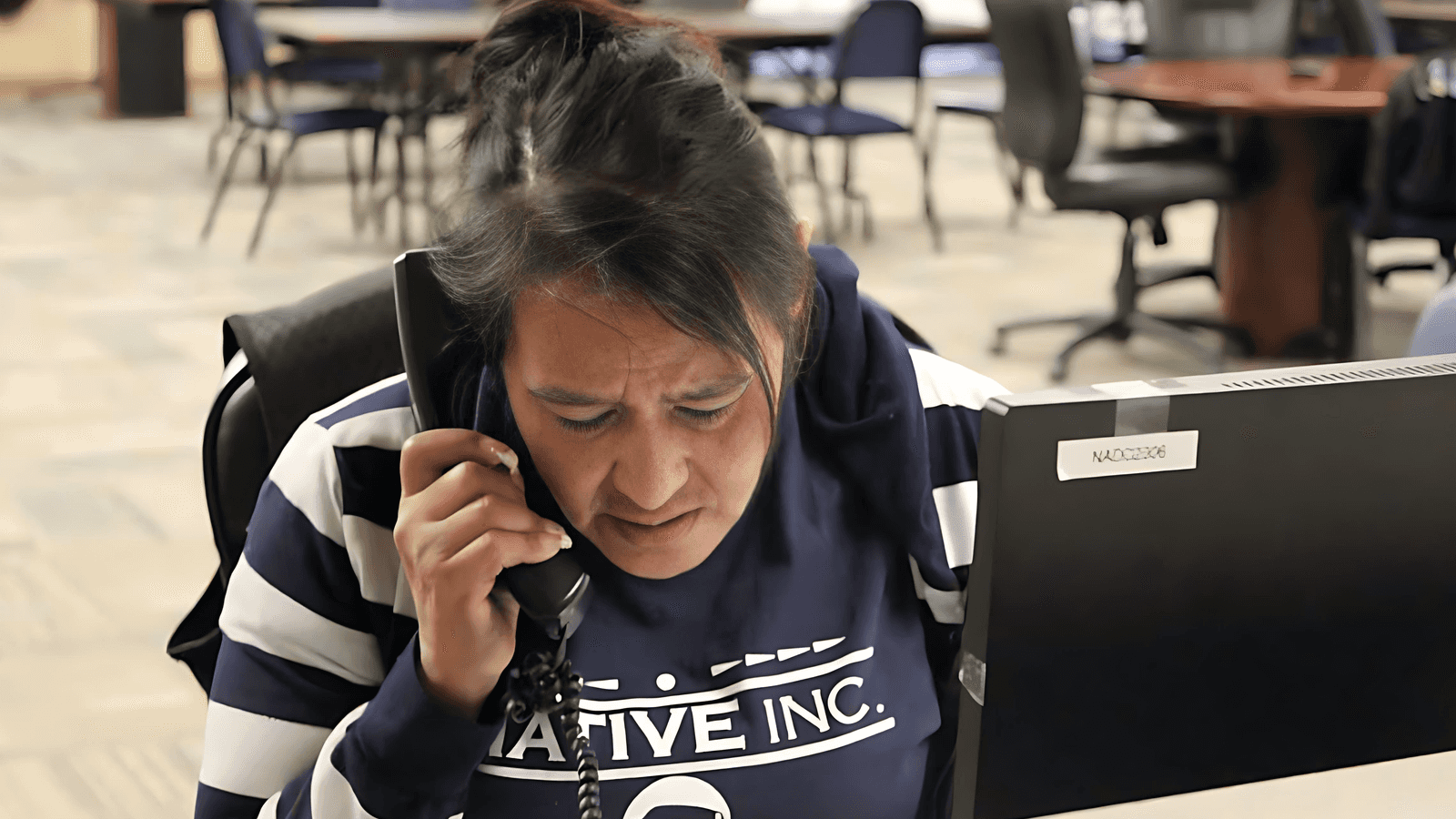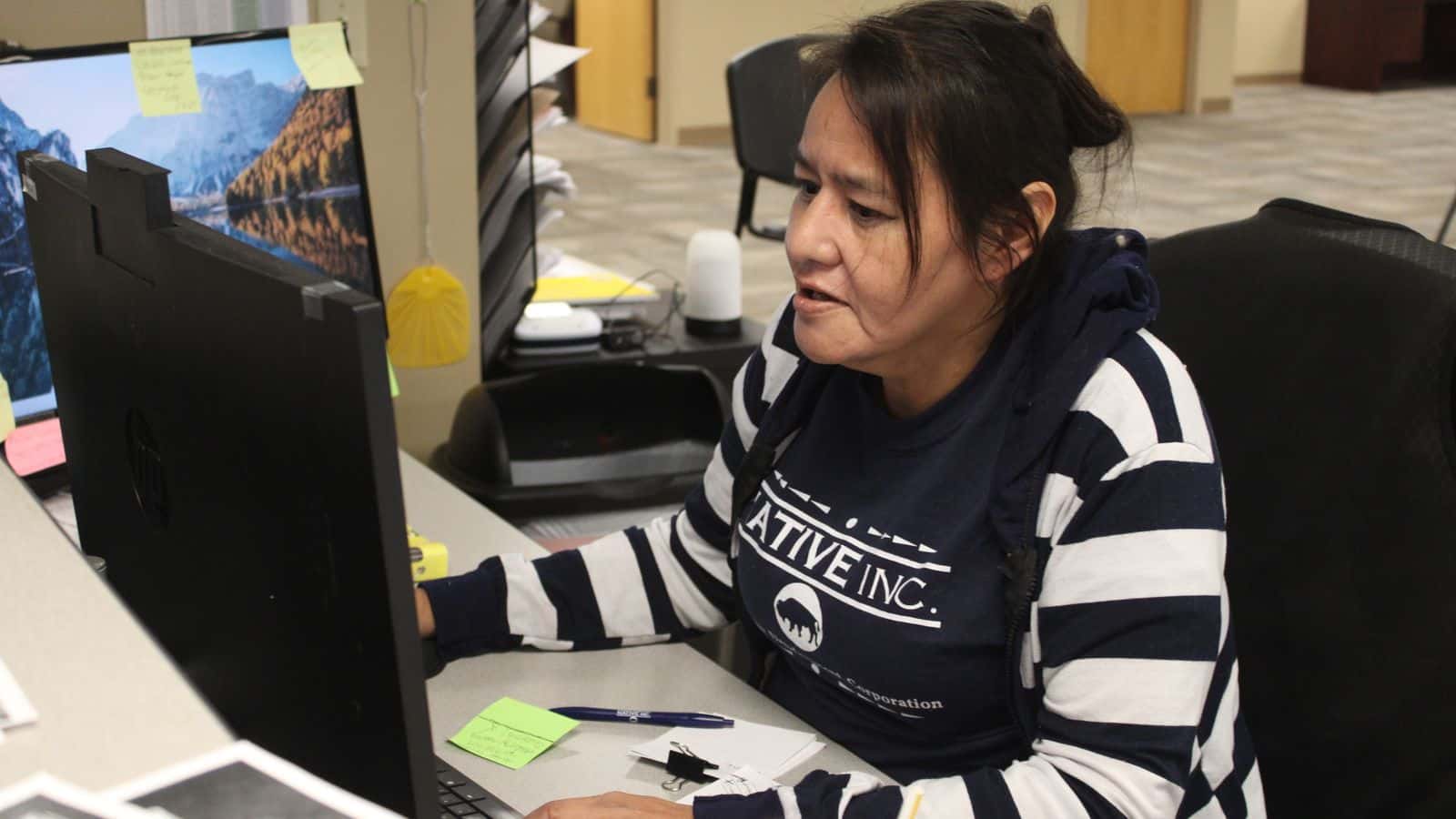Standing Rock woman’s personal history inspires her to help others
Two years ago, Angela Buckley-Tocheck turned to Native Inc. for assistance with housing and to escape traffickers. Now she works there

A woman stands at the receptionist’s desk at Native Inc., her eyes shifting between the director, Lorraine Davis, and the receptionist, Angela Buckley-Tochek. The three are discussing finding housing for the woman, who is living on the streets in downtown Bismarck.
Tears swell in the woman’s eyes as Davis tells her they will find her a place to stay. “Thank you, God bless you,” the woman says as she wraps her arms around Davis.
“It makes me angry because no one should have to feel that way,” Buckley-Tochek later said. She couldn’t help but wonder how many places the woman went to before finally finding a place that offered help without judgment.

Native Inc. is an organization serving unhoused Indigenous people and people facing addiction in the Bismarck-Mandan area. It also has an office in Fargo and will be opening another location in Grand Forks in November, Davis said.
The organization is grounded in Native culture and community as a form of healing. Buckley-Tochek said people come in seeking help daily. Just two years ago, she was one of the people who walked through the doors.
Buckley-Tochek grew up on the Standing Rock Sioux Reservation in Cannon Ball, North Dakota. She was born into a large family with five brothers and a single mom.
Untitled
Buckley-Tochek said her mother struggled with alcoholism, and was often away seeking treatment. Her grandmother became her main caregiver and her inspiration.
“I was surprised her experiences with boarding school didn’t take her away from God,” Buckley-Tochek said. “She instilled a lot of values in me.”
Despite living over 40 miles from Bismarck, Buckley-Tocheck said she has always been part of the community. She was involved in a youth group in Bismarck and helped bring the group back to Cannon Ball. Her group provided meals and bible study classes to local youth.
Buckley-Tochek fell in love and eventually got married and lived in Bismarck with her husband. Because of health issues, she was told she could never have kids. But in 2012, she gave birth to her son, Vladimir.
Eventually, the couple separated. The breakup was hard on Buckley-Tochek, who grew up believing family is everything. But her life only got harder in 2015 when she was diagnosed with protein S deficiency. The rare blood mutation disorder caused Buckley-Tochek to lose consciousness, develop blood clots and have seizures. Eventually she had a major stroke and was paralyzed for two years. She said her son kept her going.
Doctors told her she would continue deteriorating and she had just months left to live.
Buckley-Tochek said around this time, she was receiving threats from someone in her life who said they wanted her medication and would break into her house and take her son if she didn’t give the pills up. Fearful her son would end up with family members on the reservation who struggle with addiction, Buckley-Tochek decided it would be best if her son went to live with his dad and his side of the family in Ohio.
“When I got sick, it blindsided me because I did everything I could to stay healthy,” Buckley-Tochek said. “I was a walking time bomb, and I didn’t even know it.”
At the time, Buckley-Tochek was enrolled in United Tribes Technical College, studying to become a teacher. The pain of losing her son caused her to spiral. She turned to alcohol and became unhoused. School took a back burner as survival became her main priority.
She tried seeking help, but faced abuse and racism in the healthcare system. Buckley-Tochek said it felt like nowhere was safe.
She remembers going to a local soup kitchen and watching men leer at women coming in for a hot meal. Buckley-Tochek said the men were looking for women to traffic, and they began to target her.
Untitled
Buckley-Tochek said it started with grooming. Men would follow her on the street outside the soup kitchen and nearby homeless shelter, offering her drugs and alcohol, or a place to sleep. Then they began spreading rumors. They took and circulated pictures of her, saying she was a prostitute. That caught the attention of other abusers who would ask her for sex.
“If you don’t comply, the men will hit you,” Buckley-Tochek said.
She said a recovery leader would solicit homeless women on the street, offering them money, transportation and drugs. She said he took women back to his place, gave them drugs or alcohol and picked out clothing to dress them up in. Occasionally, other men were invited to the house and paid to enter with money or drugs.
Buckley-Tochek said she saw this happen to other women and faced similar abuse herself.
“I knew I was going to die because of how many times I was attacked and because of how many times I was assaulted,” Buckley-Tochek said. “But I came back because I remember my grandma told me, ‘If all the good people leave, then what will happen to the world?’”
Buckley-Tochek said in some of her darkest moments, she thought of her son. Shortly after he moved to Ohio, she talked with him on video chat. He wanted to show her his latest Lego creation: a pirate ship with a long-haired Lego figure at the top.
He told her the figure was her, but that she wasn’t a typical pirate. Instead, she used her pirate power to save people. Buckley-Tochek remembers thinking if her son thought so highly of her, she too should recognize her worth.
“I’m a mom. I’m someone’s daughter. I have nieces and nephews,” Buckley-Tochek told herself.
Untitled
Two years ago, while at an apartment seeking shelter, Buckley-Tochek noticed a magazine. On the cover was Lorraine Davis, the director of Native Inc.
Buckley-Tocheck said she wanted to get help, but didn’t know where to go or who would believe her. She came to Native Inc.’s Bismarck location to meet Davis, whose powerful story of sobriety inspired her.
“Lorraine told me, ‘Let’s get you safe and the rest will work itself out,’” Buckley-Tochek said. “Having that acceptance and that love, I forgot what that was like.”
Buckley-Tochek began staying at a local homeless shelter and visiting Native Inc. every day.
“She shared and was emotional,” Davis said. “I could tell she needed more time. I knew I needed to visit with her and get to know her to see what her plans are and what her goals are. That was the very start of her healing process.”
Buckley-Tochek volunteered for Native Inc. for two years as she worked toward a more stable life. She went into recovery with her boyfriend, whom she met while homeless. She is proud to say she has been sober for more than a year and is in a happy relationship. She graduated from college, found a place to live and has been working as a receptionist for Native Inc. for about nine months, helping other survivors.
“I am so proud of her. She’s my inspiration,” Fanchon Frazier said.
An enrolled citizen of the Cheyenne River Sioux Tribe, Frazier met Buckley-Tochek in school when they were 14. Frazier said they didn’t always fit in growing up, so they had each other's backs. Decades later, they still do.
“This past winter if she wasn’t here, I don’t know what I would’ve done. She fed me,” said Frazier, who has also struggled with being unhoused. “No matter what she’s got going on in her life, even if it’s bad, she’s got a smile on her face and keeps moving forward.”
Frazier now lives with her aunt but continues to visit Native Inc.
Buckley-Tochek has shared her story to raise awareness, testifying to state legislators and attending tribal council meetings.
Davis said local businesses have held meetings alongside Bismarck Public Health to address safety concerns for both workers and unhoused individuals. Native Inc. held a human trafficking awareness training Oct. 7 for community members to learn about the signs of trafficking and how to report it. The presentation was done by two specialists from the North Dakota Bureau of Criminal Investigation.
“People are trying to survive out there,” Davis said. “I’ve learned so much about that. Women are being trafficked and being raped. There are vehicles that drive around trying to exploit.”
Davis said she also reported human trafficking concerns to local law enforcement and encouraged them to monitor the block.
Native Inc. also attended an MMIP training in Wisconsin in October to gain certification to offer traditional services for relatives of missing and murdered Indigenous people. Davis said she and the Domestic Violence Coordinator who also attended the MMIP healing training will launch community healing sessions in December. Davis said she will have a counselor onsite while hosting these sessions.
Untitled
Buckley-Tochek said she has lived beyond what doctors expected, and she is now on a waitlist for a new liver. In May, Buckley-Tochek saw her son for the first time in seven years. He is still living with his dad, but they talk regularly, she said.
Buckley-Tochek said she was nervous to see him again. But when the car window rolled down and she saw his face, she beamed. The two of them instantly began laughing and cracking jokes like no time had passed.
“I have to leave something for my son to believe in in this world,” Buckley-Tochek said. “I want him to know that God is good.”
Jolan Kruse

Sharing Is Caring
This article is not included in our Story Share & Care selection.
The content may only be reproduced with permission from the Indigenous Media Freedom Alliance. Please see our content sharing guidelines.
© Buffalo's Fire. All rights reserved.
Help us keep the fire burning, make a donation to Buffalo’s Fire
For everyone who cares about transparency in Native affairs: We exist to illuminate tribal government. Our work bridges the gap left by tribal-controlled media and non-Native, extractive journalism, providing the insights necessary for truly informed decision-making and a better quality of life. Because the consequences of restricted press freedom affect our communities every day, our trauma-informed reporting is rooted in a deep, firsthand expertise.
Every gift helps keep the fire burning. A monthly contribution makes the biggest impact. Cancel anytime.
Respect The Fire
At Buffalo's Fire, we value constructive dialogue that builds an informed Indian Country. To keep this space healthy, moderators will remove:
- Personal attacks, harassment, or hate speech
- Spam, misinformation, or unsolicited promotion
- Off-topic rants and excessive shouting (All Caps)
Let’s keep the fire burning with respect.






